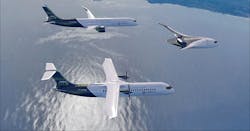Airbus Plans Hybrid-Electric Commercial Jets
Airbus revealed it is developing hybrid-electric propulsion capability for its jets as part of the effort to reduce carbon emissions in commercial aviation. The news was part of the aircraft builder’s documentation of CO2 emissions projections for the service life of its aircraft, known as a “Scope 3” declaration.
Aviation industry sources claim the commercial sector produces 2.5% of man-made CO2 emissions and 12% of CO2 emissions in transportation, and the global industry has committed to reduce net carbon emissions to 50% of 2005 levels by 2050.
Airbus estimated lifetime emissions for jets it delivered in 2019 will amount 740 million metric tons of CO2 over more than two decades of average service life. Jets delivered in 2020 have estimated lifetime emissions of 440 million metric tons of CO2, it said.
To date, the Airbus focus to reduce carbon emissions has been on hydrogen fuel; it has previously committed to introduce a hydrogen-powered commercial plane by 2035.
Last September, Airbus unveiled three concept aircraft to demonstrate its zero-emission goals. The ZEROe proposals include turbofan, turboprop, and blended-wing body configurations that are powered by hydrogen propulsion. All ZEROe concepts are hydrogen-hybrid aircraft, Airbus said.
Now, Airbus has indicated it is “exploring a variety of hybrid-electric and hydrogen technology options”, drawing on work it has done to develop electric flight technology.
Jet engine builders as well as aircraft OEMs have been pursuing various technical approaches to reducing emissions from commercial jets, mainly focusing on alternative fuel blends. In January, Boeing committed itself to ensure by 2030 that all of its commercial aircraft are capable and certified to operate entirely with “sustainable aviation fuels” (SAF), which currently are limited to 50% of aircraft fuel blends. SAF is jet fuel produced using waste oils from biological sources (e.g., cooking oil, other non-palm waste oils from plants, agricultural residue, or non-fossil CO2), or solid waste from homes or businesses (e.g., packaging, paper, textiles, food waste.)
Engine builder Rolls-Royce last fall said it is conducting ground tests on a high-bypass turbofan engine using 100% sustainable aviation fuel for the first time, aiming to establish that unblended SAF can be used in current engine models in place of current jet-fuel formulations.
